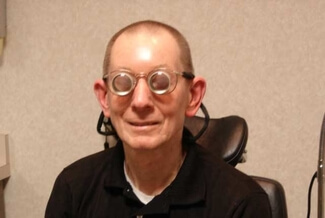
What is Age-Related Macular Degeneration (AMD)?
Macular degeneration refers to a group of disorders that adversely affect the central portion of the retina and cause vision loss. This disease tends to occur among elderly patients and is the most common cause of legal blindness in the developed world. It is also one of the most common conditions that low vision eye doctors, such as Dr. Yanna Nachtigall, manage on a daily basis.
“Age-related macular degeneration” (AMD), however, refers to the late-onset form of macular degeneration, and is very common, with as many as 10% of patients over the age of 65 affected in some form or another.
AMD, which affects both eyes, is caused by the deterioration of the macula, the central part of the retina, which results in a slow but steady loss of central vision. The macula, which is about the size of the capital letter “O” in this sentence, allows us to experience the most acute and detailed vision. People rely on the macula for everyday tasks such as reading, driving, recognizing faces, watching television, and doing fine and detailed work.
Though macular degeneration causes central vision loss, color vision and peripheral vision may remain clear. Those with AMD experience gradual visual deterioration that affects both eyes at different rates.
At Low Vision Optometry of Central Pennsylvania, we work closely with each patient to establish a customized plan to help maximize their remaining vision in order to compensate for vision loss due to macular degeneration.
What Are the Symptoms of Macular Degeneration?
The following are signs that may point to macular degeneration. If you or someone you know is experiencing any of these symptoms, consult Dr. Yanna Nachtigall immediately.
- Straight lines and the center of vision appear distorted
- The center of vision seems dark, blurry or has a “white-out” appearance
- Colour perception changes
- Blurred vision
- Difficulty doing close work
- Struggling to adapt to low light
- Problems recognizing faces
How is Macular Degeneration Diagnosed?
A patient’s declining vision is often the first indicator of macular degeneration. The earlier the diagnosis, the better — which is why comprehensive exams are so important. During these eye exams, the eye doctor may dilate the pupils using eye drops in order to check for any damage in the retina.
Optical Coherence Tomography (OCT), a non-invasive technique to image the retina, may also be used. If the doctor suspects advanced dry AMD, this technique will help detect the regions of the retina that are thinning.
What Causes Macular Degeneration?
 The exact cause of macular degeneration remains uncertain. Genetics do play a role, however, as many people with AMD have a family history of this condition. Furthermore, several studies have shown that nutrition and lifestyle factors contribute to the onset and progression of AMD, including:
The exact cause of macular degeneration remains uncertain. Genetics do play a role, however, as many people with AMD have a family history of this condition. Furthermore, several studies have shown that nutrition and lifestyle factors contribute to the onset and progression of AMD, including:
- Being severely overweight/ obese
- Eating a poor diet: high levels of saturated fat and low in essential nutrients
- High blood pressure and high cholesterol levels
- Cigarette smoking
- A history of cardiovascular disease
What Are the 2 Types of AMD?
There are two types of age-related macular degeneration: “wet” and “dry”.
Dry macular degeneration
Dry macular degeneration is the most common form of AMD and affects 70% of people who develop the condition. This type of macular degeneration is characterized by age-related thinning of the macular tissues, which leads to vision loss.
Wet macular degeneration
30% of those with AMD have the “wet” form, which develops when abnormal blood vessels grow beneath your retina, leaking fluid and blood. This damages and swells up the macula, causing rapid and severe deterioration of eye health and permanent vision loss.
The “wet” form leads to 90% of all cases of legal blindness among those with macular degeneration. Other forms of macular degeneration may develop among younger patients. These may be associated with genetics, diabetes, nutritional deficits, head injury, infection, and other factors.
If I have macular degeneration in a single eye, will it develop in the other?
Yes, this tends to happen. Only one eye may be affected in the early stages, but as the disease progresses, the condition typically affects both eyes.
Is there a cure for macular degeneration?
Currently, there is no known cure for macular degeneration. However, there are ways to stop macular degeneration from progressing —naturally, this depends on the type and degree of the condition.
The treatments may include nutritional intervention, special drugs such as Avastin, Lucentis or Eylea, or photodynamic therapy. There is also a range of low vision aids and techniques to maximize the use of peripheral vision to help patients better adapt to the loss of central vision.
Furthermore, there are things you can do to reduce your risk and potentially slow the progression once you’ve been diagnosed. We recommend you adopt a healthy lifestyle, which includes no smoking, exercising regularly, adopting a diet rich in green, leafy vegetables and fish, and ensuring blood pressure and cholesterol are under control.
The team at Low Vision Optometry of Central Pennsylvania will provide you with all the tools and devices to maximize any vision you have left. Early and prompt intervention with a trusted eye professional is your key to success.
 Can Nutritional Changes Slow the Progression of Macular Degeneration?
Can Nutritional Changes Slow the Progression of Macular Degeneration?
Research has found an association between macular degeneration and a diet high in saturated fat and low in carotenoid pigments. By eating a diet rich in fresh fruits and dark green, leafy vegetables, one can delay or diminish the severity of age-related macular degeneration. High doses of vitamins C, E, Beta carotene and zinc have also been found to significantly reduce the risk of visual loss.
Is macular degeneration hereditary?
Macular degeneration appears to be passed down from generation to generation in certain families, while not in others. Because macular degeneration is generally developed in the late-stages of one’s life, it is challenging to study successive generations. Further research is needed to determine any genetic association with hereditary macular degeneration.
Does the sun impact macular degeneration?
Yes. The blue rays emitted by the sun have been shown to accelerate macular degeneration more than any other rays on the spectrum. Sunlight or its reflection in the water or metals may cause the progression of macular degeneration. Sunglasses are an excellent way to block out these dangerous rays.
Does high blood pressure affect macular degeneration?
Yes, high blood pressure tends to worsen certain types of AMD, particularly the “wet” kind.
Does smoking affect the development of macular degeneration?
 Definitely. Smoking cigarettes can accelerate the development of macular degeneration, especially the “wet” form. So think twice before lighting your next cigarette.
Definitely. Smoking cigarettes can accelerate the development of macular degeneration, especially the “wet” form. So think twice before lighting your next cigarette.
Why is Early Detection Important?
Early detection is critical since macular degeneration can at times be treated before symptoms even appear. This may delay, or at the very least —reduce the severity of the condition.
Contact us today at Low Vision Optometry of Central Pennsylvania, and Dr. Yanna Nachtigall will perform a comprehensive eye exam to assess your eye condition and discuss your options. If diagnosed with macular degeneration, our staff will provide you with customized low vision glasses and other aids to help you make the most of your remaining vision. Low Vision Optometry of Central Pennsylvania serves patients in Lititz, Lancaster, York and Hershey, throughout Pennsylvania.
